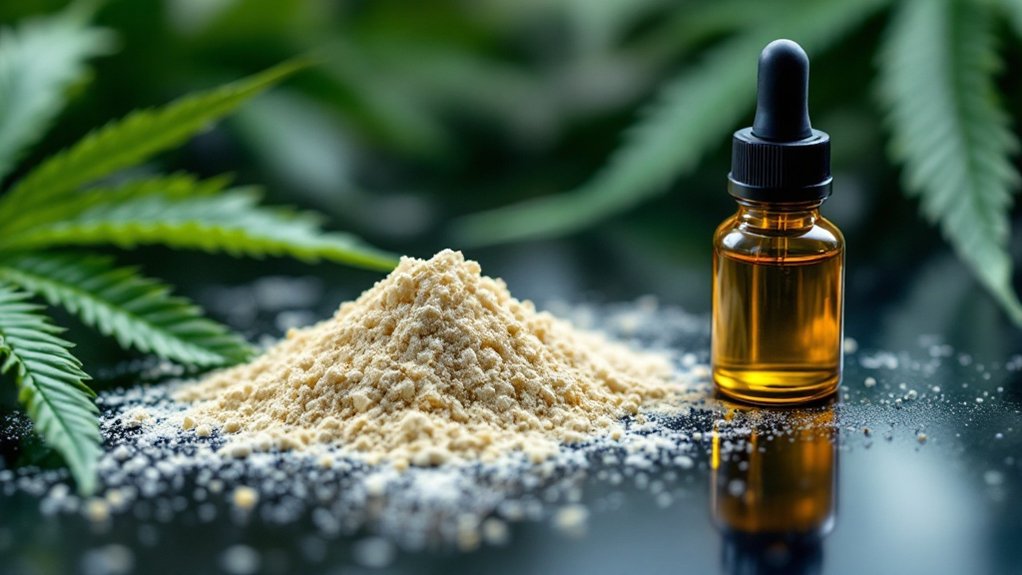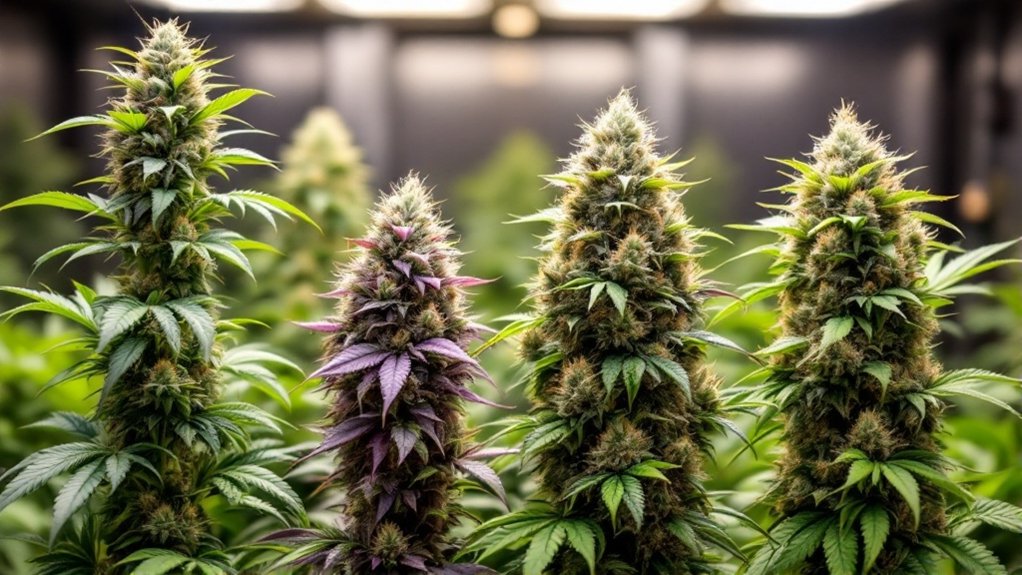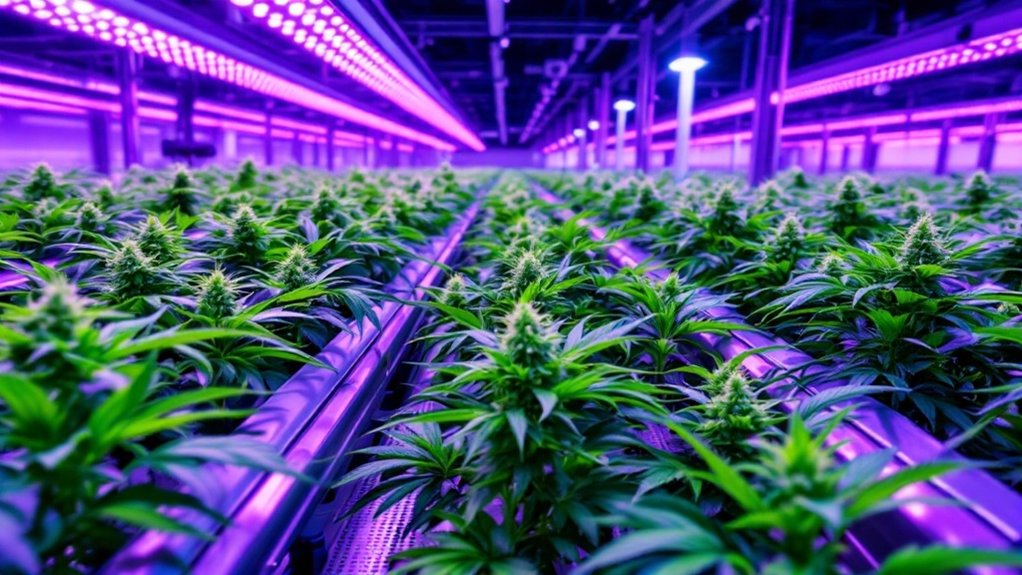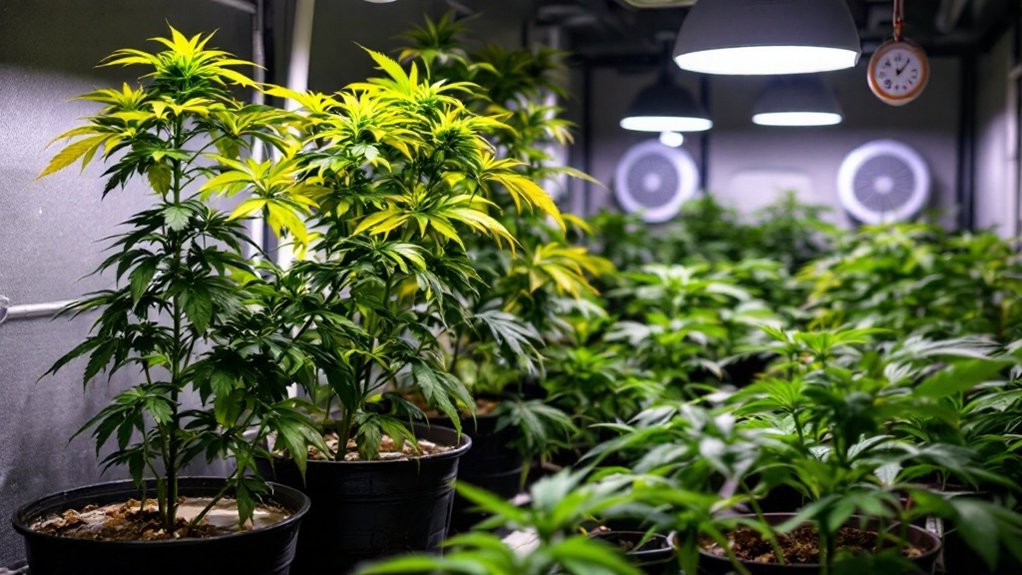Hexahydrocannabinol (HHC) is a semi-synthetic cannabinoid that produces psychoactive effects similar to THC but with reduced intensity. Created through hydrogenation of THC molecules, it interacts with CB1 receptors in the brain to induce relaxation, euphoria, and altered sensory perception. HHC exists naturally in trace amounts in cannabis plants, though commercial versions are typically laboratory-synthesized. Available in vape cartridges, edibles, and tinctures, HHC occupies a regulatory gray area in many jurisdictions. Further exploration reveals important distinctions in its chemical structure and safety profile.

Hexahydrocannabinol (HHC), a semi-synthetic cannabinoid with psychoactive properties, has emerged as a significant alternative in the ever-expanding landscape of hemp-derived compounds. This molecule shares structural similarities with delta-8 and delta-9 THC but differs through hydrogenation of its carbon bonds, which increases molecular stability.
While HHC exists naturally in trace amounts within cannabis and hemp plants, commercial products typically contain laboratory-synthesized HHC created through a hydrogenation process applied to THC molecules, resulting in multiple isomeric forms including (9R)-HHC and (9S)-HHC.
The psychoactive effects of HHC result from its interaction with CB1 receptors in the brain, producing experiences comparable to those of THC but generally with reduced intensity. Users commonly report feelings of relaxation, euphoria, and altered sensory perception when consuming HHC products. The potency typically positions HHC between delta-9 THC and delta-8 THC on the spectrum of psychoactivity, with specific effects varying based on the isomeric composition and dosage utilized. The 9R-HHC isomer exhibits much stronger binding affinity to cannabinoid receptors than its 9S-HHC counterpart, explaining potency variations in commercial products.
Consumers access HHC through various product formulations including vape cartridges, edibles, tinctures, and oils. These products have proliferated rapidly across head shops, convenience stores, and online marketplaces since the mid-2020s. Vaporization offers faster onset of effects, while oral consumption methods like gummies and tinctures provide a more gradual experience with extended duration.
The market expansion reflects growing consumer interest in alternatives that provide THC-like effects while potentially avoiding legal complications. Research into HHC has suggested potential therapeutic applications, including pain relief and anti-inflammatory effects, though more studies are needed.
The regulatory status of HHC remains ambiguous in many jurisdictions. Its derivation from hemp plants has allowed manufacturers to operate within loopholes of existing cannabis legislation, though this legal gray area is evolving rapidly. Some regions have begun implementing specific restrictions on HHC as its popularity increases and awareness grows among regulatory authorities.
The synthetic nature of commercial HHC may also subject it to analog drug laws in certain locales.
Scientific research on HHC’s safety profile remains limited, with current understanding primarily derived from anecdotal reports. Commonly reported adverse effects include dry mouth, dizziness, and occasional anxiety at higher doses.
The lack of thorough studies raises questions about long-term safety, potential drug interactions, and standardization of commercial products. As with other novel cannabinoids, concerns exist regarding product purity, manufacturing standards, and chemical contaminants due to limited regulatory oversight in the rapidly evolving landscape of hemp derivatives.
Frequently Asked Questions
How Long Does HHC Stay in Your System?
HHC remains detectable in various bodily specimens for different durations.
In urine, it persists for 3-7 days in occasional users and up to 30 days in frequent users. Blood tests can identify HHC for 24-72 hours, while saliva tests detect it for 1-3 days.
Hair follicle tests offer the longest detection window of up to 90 days. Detection timeframes vary based on metabolism, usage frequency, dosage, consumption method, and individual physiological factors.
Will HHC Make Me Fail a Drug Test?
HHC consumption presents significant risk for failing drug tests. Standard panels do not specifically test for HHC, but its metabolites closely resemble those of THC, creating high potential for cross-reactivity.
Urine tests are particularly susceptible to false positives due to structural similarities between these compounds. Detection windows vary by test type: 30+ days for urine, up to 72 hours for blood and saliva, and 90 days for hair tests.
Individual factors like metabolism, usage frequency, and product purity further influence test outcomes.
What’s the Difference Between HHC and Delta-8 THC?
HHC and Delta-8 THC differ primarily in their chemical structures.
HHC is a hydrogenated form of THC with no double bonds, containing two additional hydrogen atoms, while Delta-8 features a double bond in the eighth carbon position.
This structural difference affects potency, with HHC generally being stronger than Delta-8 but milder than Delta-9 THC.
Delta-8 produces more gentle effects characterized by clear-headed euphoria, while HHC’s effects more closely resemble traditional THC’s psychoactive profile.
Is HHC Legal in States Where Marijuana Is Prohibited?
HHC’s legality in marijuana-prohibited states depends entirely on specific state laws.
While federally legal under the 2018 Farm Bill when derived from hemp containing less than 0.3% Delta-9 THC, individual states maintain autonomy over regulation.
Some marijuana-prohibiting states permit HHC sales and possession, while others have explicitly banned it alongside other cannabinoids.
State legislatures frequently update these regulations, creating a complex legal landscape that varies greatly across the country—requiring consumers to research their specific state’s current laws.
What Are the Potential Side Effects of HHC?
HHC may cause psychological effects including anxiety, paranoia, confusion, memory issues, sleep disturbances, and potential hallucinations at high doses.
Physical side effects commonly include dry mouth, red eyes, increased heart rate, impaired coordination, and dizziness.
Approximately 17% of users report adverse reactions, with 20% of those who discontinue use experiencing withdrawal symptoms.
Additional concerns include accident risks when operating vehicles, potential for developing cannabis use disorder, and possible lung injury from vaping products.









